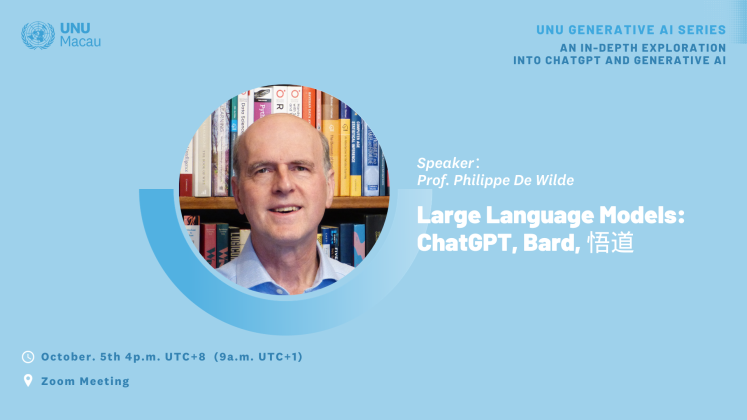Prof. Philippe De Wilde, from the University of Kent, United Kingdom, will be our next guest speaker in the UNU Generative AI Series, with a webinar on “Large Language Models: ChatGPT, Bard, 悟道”, to be held on October 5, at 4 pm (UTC+8).
In this lecture, Prof. De Wilde will explain some technical aspects of generative Artificial Intelligence (AI) Large Language Models, such as ChatGPT, to a non-technical audience. The aim is that this elementary technical knowledge will allow participants to form an opinion on whether ChatGPT ‘understands’ anything, whether it plagiarises, and how reliable it is.
“I will also show that AI is cyclical, and that boom is sometimes followed by bust. We will look at the large players in the US and in China. Finally, we will consider the notion of originality in a post-ChatGPT world and how we will need to revise our standards for what is original in research as well as in student work”, Prof. De Wilde says in the talk’s Abstract. He adds: “Just as calculators have changed the way we calculate, Large Language Models will change the way we write. But will they change the way we think?”
Prof. Philippe De Wilde is a Professor of Artificial Intelligence in the Division of Natural Sciences at the University of Kent, United Kingdom. He promotes the use of artificial intelligence and machine learning in Biosciences, Medical Science, and Physics, while working in the context of digital humanism on transparent and humane AI.
If you would like to join this talk, please register here!
About UNU Generative AI Series
UNU Generative AI Series: An Indepth Exploration into ChatGPT and Generative Artificial Intelligence (AI) is a monthly series of webinars that, recognizing the rapid advancements and transformative potential of Artificial Intelligence, aims to cultivate a comprehensive understanding and foster informed and responsible engagement with these emerging technologies.
United Nations University Institute in Macau (UNU Macau) is leading this programme, inviting distinguished scholars and researchers from the UNU system and an extensive network in academia and broader field, to deliver presentations on topics related to generative AI. The discussions will encompass a wide array of themes, from technical advancements to the ethical implications, societal impacts, and policy considerations surrounding the advanced technology. This series is aiming at presenting diverse perspectives on how generative AI will impact our collective future on health, education, environment, climate, UN peacekeeping, and humanitarian work.
In the first webinar, UNU Macau's Head of Research, Dr. Serge Stinckwich, led the discussion "On the unsustainability of ChatGPT: Impact of Large Language Models on the Sustainable Development Goals". In the second talk, we welcomed Prof. Fernando Buarque, from the University of Pernambuco, Brazil, who shared his insights on "Why Generative Methods Are Still Missing Something to Become Responsible (AI)".
You can follow our UNU Generative AI Series page for keeping up to date with upcoming talks or reviewing video recordings from past sessions.


